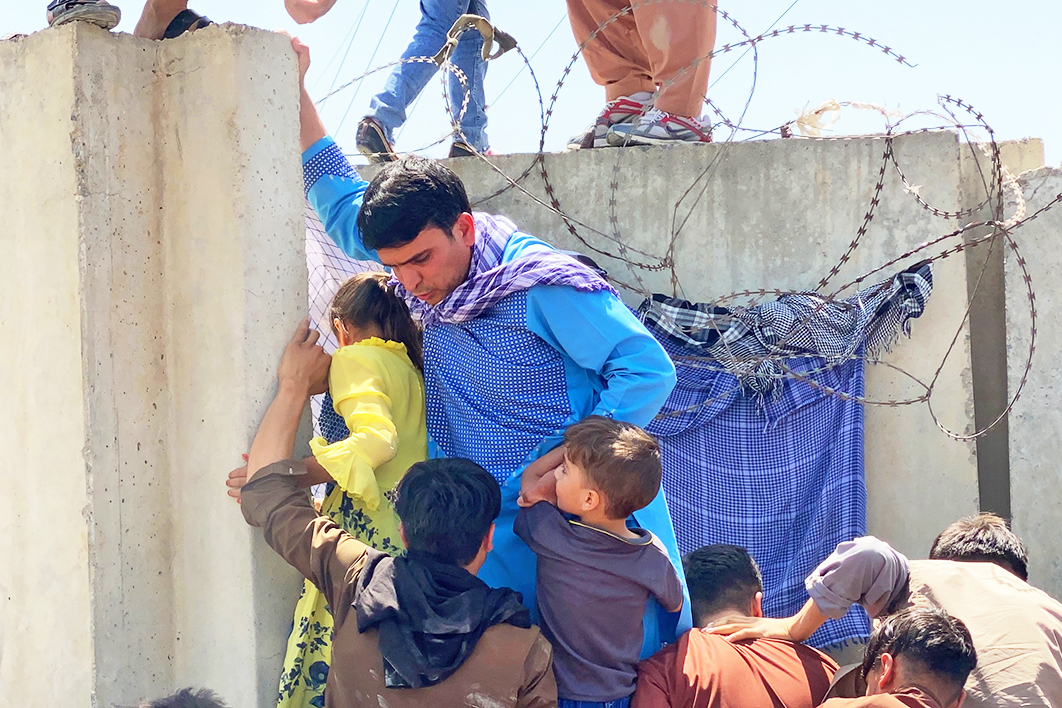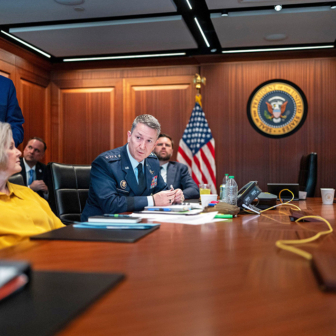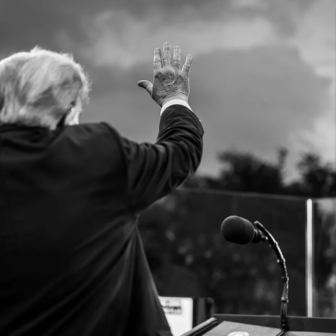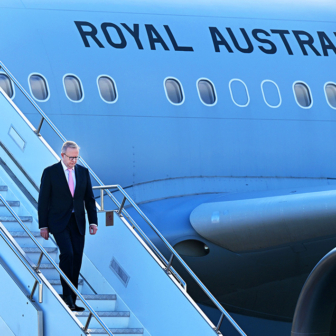Early last month US president Joe Biden made a bold declaration that he would quickly come to regret: “The Taliban is not the… North Vietnamese army. They’re not — they’re not remotely comparable in terms of capability. There’s going to be no circumstance where you see the people being lifted off the roof of [an] embassy… from Afghanistan.”
Biden was right about one thing, at least. The abrupt collapse of another bankrupt regime — propped up for years beyond its deserved expiry only with the lives and largesse of the United States and its dutiful allies — didn’t end on an embassy rooftop. Instead, there was a terrified stampede across a nearby airfield.
This time the spectacle was more shocking as it unfolded in graphic live streaming around the world. The humiliation of the fall of Saigon was etched in the iconic black-and-white image, taken by United Press International photographer Hugh van Es, of a helicopter lifting desperate refugees from a rooftop near the American embassy. The capitulation in Kabul would be captured on scores of smartphones — defined with appalling images of desperate Afghans clinging to the fuselage of a departing US transport plane before plunging to their deaths.
Biden was also right to call out the unfair comparison between the defeat in Vietnam and that in Afghanistan, but not in the context he implied. The Taliban is certainly not the North Vietnamese army. In the Vietnam war, the United States was beaten by millions of North Vietnamese troops and Vietcong fighters backed by massive military and economic aid from the Soviet Union and China. In Afghanistan, it took just 80,000 Taliban fighters with rudimentary weapons and an unshakeable fundamentalist faith to exhaust the will of the most powerful armed forces in the world.
The waste, however, has indeed been comparable. As Biden confirmed on Monday, close to US$1 trillion has been squandered in Afghanistan over the past two decades — only to see the Taliban come full circle from a stunning victory in 1996 to a stunning return to power in 2021. And although the casualties are nothing like the 47,000 American military personnel who died in Vietnam, more than 4000 American troops and contractors have been killed in Afghanistan and another 20,000 wounded — along with the 50,000 Afghan civilians and a similar number of Taliban fighters estimated to have perished.
As Biden ruefully conceded, the speed with which the Taliban swept across the country recapturing cities and towns before reaching the capital in just ten days — and the correspondingly rapid disintegration of the 300,000-strong Afghan army — has been breathtaking. As recently as early last week, the Washington Post was reporting US military estimates that it would be at least another month before the city fell.
But the inevitability of this week’s events should have surprised no one, least of all the Republican rabble now baying for Biden’s blood. “What we have seen is an unmitigated disaster, a stain on the reputation of the United States of America,” intoned Republican Senate leader Mitch McConnell. “Every terrorist around the world, in Syria, in Iraq, in Yemen, in Africa, are cheering the defeat of the United States military by a terrorist organisation in Afghanistan.”
In truth, Biden is little more than a late-shift janitor charged with clearing up the mess created by his predecessors, most recently the man for whom McConnell ran a shameless four-year protection racket, president Donald Trump. Trump’s decision to cut a deal with the Taliban in February last year made their return to power inevitable. Under the agreement, the United States and NATO promised to withdraw all their troops within fourteen months in return for the insurgents pledging not to allow al Qaeda or any other extremist group to operate again in the areas they control. Whether or not the Taliban kept their side of deal — many analysts believe their links with al Qaeda remain strong — the die was cast.
Of course, ultimate responsibility for the debacle rests with Trump’s Republican predecessors in the Bush administration, which drove the Taliban out of Kabul in 2001 in their fumbled pursuit of Osama bin Laden. As former Australian foreign minister Bob Carr said this week, “They’ll blame Biden, but Afghanistan, like Iraq, was the work of the neo-cons who fooled the Bush administration and seized 9/11 to prove American weaponry could dominate. Tribesmen with Kalashnikovs prevailed.”
The speed with which the Afghan government fell apart over recent weeks has laid bare how thin the veneer of its control was all along, and how utterly dependent it always was on US dollars and the Western military. As Biden rightly postulated, another year, five years or ten years on US life support would not have changed the prognosis for the corrupt and bitterly divided administration — and would have done nothing to blunt the stubborn resistance of the Taliban. “We gave them every chance to determine their own future,” said Biden of the fallen government. “We could not provide them with the will to fight for that future.”
Not surprisingly, the return of the Taliban has triggered alarm around the world. The images from Kabul over recent days seem like a flashback to 1996: a movement frozen in time, at least sartorially, as the same sullen men with beards and turbans brandished their weapons while posing with flags and banners in newly captured government offices, or roamed the largely deserted streets of the city.
It was almost inevitable that thousands of panicked residents remembering the brutal first coming of the Taliban would overrun the airport in a desperate and mostly vain bid to escape from the country. And it was grimly predictable that the women of Kabul — banished from their jobs and schools and ruthlessly suppressed last time around — would flee indoors and hunt for their mothballed burqas.
The decision by president Ashraf Ghani to flee last Sunday — reportedly aboard a plane overloaded with bags of cash — has been denounced by his former political partners and ridiculed by Joe Biden. While Ghani sought to clothe his escape with the virtue of seeking to avoid bloodshed, it is likely the blood he worried most about was his own. He would have been acutely aware that when the Taliban first came to Kabul, his predecessor, the Soviet-installed Mohammad Najibullah, was abducted from his refuge in the United Nations compound and tortured to death, his body dragged through the streets behind a truck before being suspended from a traffic light pole in front of the presidential palace.
While first appearances can certainly be deceptive, the return of the Taliban has so far been remarkably peaceful, a largely bloodless coup. While there were reported episodes of fighting and reprisals as the insurgents swept across the country in the face of token resistance from government forces, their arrival in Kabul this time came without violence or loss of life.
The Taliban leadership, so far at least, has been true to its word. “We want a peaceful transfer of power,” declared spokesperson Suhail Shaheen, as the Taliban forces paused at the entrances to the city, only proceeding as it became clear the regime’s soldiers and police had abandoned their posts. Shaheen told the BBC the Taliban wanted to form an “inclusive” government to run its new Islamic Emirate of Afghanistan: “There will be no retaliation and revenge.” There would also be an amnesty for those who had collaborated with the former regime and foreign governments: “We once again invite them all to come and serve the nation and the country.”
In a media conference on Tuesday, Taliban representative Zabihullah Mujahid indicated that the new regime would honour its undertakings not to allow the country to again become a sanctuary for terrorism: “We will not be allowing the soil of Afghanistan to be used against anybody.” And he promised that women’s rights would be protected: “All our sisters, all our women are secure… They can work. They can get education. They are needed in our society and they will be actively involved.”
Such pledges should rightly be viewed with great scepticism given the Taliban’s brutal track record, but there are reasons to believe their leadership will proceed more cautiously and perhaps more inclusively this time around. One of the movement’s highest priorities will be to win international legitimacy. Already Russia and China have effectively recognised the new order. Having engineered the negotiations that opened the way for the Taliban’s return, the United States can hardly now deny the reality of that return to power nor, more importantly, fail to acknowledge that for the first time in the modern history of Afghanistan a single political group controls the entire nation.
It was the US’s refusal to allow the Taliban to take Afghanistan’s seat at the United Nations after their victory in 1996 that was widely credited with driving the isolated regime into the embrace of Osama bin Laden, who then plotted the devastation of 9/11 from within Afghanistan. Western governments and Afghanistan’s neighbours will be acutely vigilant watching for any signs of a renewed embrace of extremist allies now that the Taliban’s own revolution has been re-won. And the purportedly more pragmatic new leadership group will be mindful that it was the enabling of al Qaeda that visited the wrath of the West on their last government and saw them driven into the political wilderness for twenty years.
As Western governments consider the parameters of their relationships with the new Afghanistan, they would do well to contemplate anew the dangers and costs of adventures in foreign nation-building. Once more Afghanistan has taught a humiliating lesson to foreigners seeking to impose their will and way of life on its proud and ancient civilisation. First, it was the imperial British whose noses were bloodied in a series of presumptuous military campaigns in the nineteenth century. Then it was the Soviet Union, whose ten-year occupation in the 1980s saw 15,000 of its soldiers killed and more than one million Afghans perish before the Russians were driven out by the Mujahideen alliance. Now it is the turn of the United States to make its inglorious exit.
The failure of the latest Afghan misadventure is a failure shared by all of the American allies, including Australia.
Australia stumbled into Afghanistan on the coat-tails of our powerful ally — desperate as ever to ingratiate ourselves by delivering a marginal military contribution. In Vietnam, our war for the asking, as Michael Sexton revealed it to be, cost more than 500 Australian lives. In Afghanistan, we lost forty-one — each of them killed in a fight not of their making. And like their forefathers thrust onto the shores of Gallipoli a century before them, many must have wondered what exactly they were doing on such a strange battleground so far from home.
In the midst of the chaos and confusion of events in Kabul this week, prime minister Scott Morrison had the temerity to cast a military defeat as a success — and to swaggeringly place Australia in a starring role in that supposed success.
“Let me say this about our presence there,” said Morrison. “We went there to stop Osama bin Laden and to stop al Qaeda having a base of operations in Afghanistan. And that’s what was achieved. We were there in the cause of freedom. And every Australian who fell in that cause… is a national hero. And for that we are forever thankful and they’ve died in a great cause.”
A great cause? In fact, despite the bloody invasion of Afghanistan twenty years ago, Osama bin Laden brazenly evaded capture and remained at large for many more years before the Americans finally tracked him down in Pakistan. Al Qaeda was forced to relocate and regroup but would remain a dangerous and elusive terrorist network. In truth, our continued presence beyond these initial military objectives served only to help prolong the violence and instability in Afghanistan. The ambition of building a new and freer society is now exposed as the profligate fantasy that it always was. •




